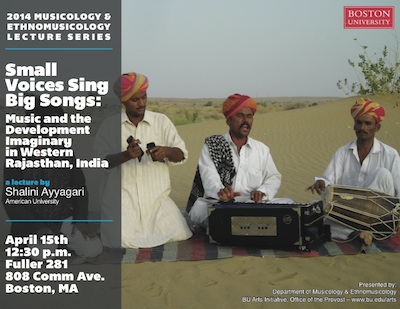Spring 2014
Small Voices Sing Big Songs:
Music and the Development Imaginary in Western Rajasthan, India
Lecture by Shalini Ayyagari, American University
Tuesday, March 15th, 2014
12:30-1:30 p.m.
Musicology Seminar Room (Fuller 281)
808 Commonwealth Avenue
This talk examines intersections of development, institutionalization, and community building in contemporary regional music practice in South Asia. The Manganiyar are a community of hereditary professional musicians who live in western Rajasthan on the India-Pakistan border, and have maintained musical practice within a strict patronage system as their caste and livelihood for centuries. However, for a number of reasons, customary musical patronage is in decline in the region. The dilemmas posed by the need for economic and social stability once secured by hereditary patrons are profound, yet Manganiyar musicians have been extremely resilient and resourceful in creating new opportunities to sustain music as a profession. While their name, Manganiyar, means “one who begs,” in recent decades Manganiyar musicians have been performing internationally on renowned concert stages like Carnegie Hall, appearing on national reality television shows like Indian Idol, and are reshaping their image in their villages through empowered acts of economic, social, and cultural reclamation. In recent years there has been an unprecedented number of non-governmental organizations (NGOs) conducting development work in Rajasthan state, grappling with issues such as environmental degradation, women’s empowerment, and education reform to name a few. Musicians from the Manganiyar community have become involved in development initiatives in the region through various creative means. In this talk, I track the interplay between themes of tradition, preservation, and the contemporary, drawing on Development Studies and Subaltern Studies, in examining the social understandings of development among the Manganiyar in what I call the “development imaginary.”
In this paper, I focus on one key Manganiyar musician who has founded his own NGO (nongovernmental organization), whose aim is the sustainability of music as livelihood. I analyze the ways in which his organization approaches musical sustainability through several vectors–– community-based education, recording and preservation, ecological rehabilitation, and entrepreneurial tourism. By examining the conditions of possibility that led this musician to a path of institutionalized community development and experimental music-making, my talk reveals an innovative grassroots “counter-development” in which Manganiyars are responding to global processes as much as they are paying attention to long-standing and locally based cultural logics.
Shalini Ayyagari is an ethnomusicologist who specializes in the music of South Asia. To date, her research has explored the connections between South Asian regional music, Subaltern Studies and postcolonialism, Borderland Studies, and Bollywood film music. Her current book project, Small Voices Sing Big Songs: Music and Institutional Culture in Rajasthan, India, is a sociocultural history and musical ethnography of the Manganiyar, a community of hereditary musicians who have maintained music within a patronage system as their caste and livelihood for centuries. She draws on Subaltern Studies and Development Studies to show how musicians in a postcolonial society have mobilized discourses of tradition and preservation, along with their own ideas of development, to use music as a way to empower their communities.
We would like to thank our co-sponsors for this event:
Department of Musicology & Ethnomusicology
BU Arts Initiative, Office of the Provost – www.bu.edu/arts
Survivors on the Thresholds of Music in Post-colonial South Korea
Lecture by Joshua Pilzer, University of Toronto
Tuesday, March 4th, 2014
5:00 – 6:00 p.m.
CAS 211
725 Commonwealth Avenue
There are a plethora of interstitial spaces between the rarified categories such as music, sound, and speech, or dance and everyday movement–heightened speech, chant, stylized walking, and many others. These are meeting grounds in which the shared features of the categories–rhythmic, melodic, textural, timbral and so on–are brought to the fore. Why are they so common? I believe this is because the shared features and threshold spaces between these arenas of experience and practice are a primary means by which the kinds of agency, meaning, sentiment and sociality cultivated in music cross into other arenas of social life, and vice versa.
This essay looks to these thresholds to understand something of the utility of music for Korean survivors of the more traumatic events of East Asia’s 20th century, in particular the Japanese military “comfort women” system and the Allied nuclear bombing of Japan. I introduce the idea of the ‘musical’, the idea of music as an adjective or a quality of human practice, to help explain this utility. Along the way I explain my basic perspective on the importance of the study of survivors’ music, the inquiry into and documentation of the musical lives of those who endure or have endured violence and traumatic experiences.
Joshua D. Pilzer (Assistant Professor of Ethnomusicology, University of Toronto) is a scholar of Korean and Japanese music. He is interested in the place of music in the texture of post-colonial Korean life, in music’s everyday social utility and poetics, in music as alternative history, and in women’s music. He is the author of Hearts of Pine: Songs in the Lives of Three Korean Survivors of the Japanese ‘Comfort Women’ (Oxford, 2012) and is currently conducting fieldwork for his next book project, an ethnography of music and song among Korean victims of the atomic bombing of Japan and their children.
We would like to thank our co-sponsors for this event:
Department of Musicology & Ethnomusicology
BU Arts Initiative, Office of the Provost – www.bu.edu/arts
Center for the Study of Asia


